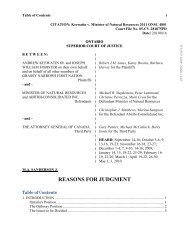Strategies for Executive Compensation: Design and Tax Issues for a ...
Strategies for Executive Compensation: Design and Tax Issues for a ...
Strategies for Executive Compensation: Design and Tax Issues for a ...
Create successful ePaper yourself
Turn your PDF publications into a flip-book with our unique Google optimized e-Paper software.
- 15 -<br />
use of the provision where amounts had to be repaid to his <strong>for</strong>mer<br />
employer.)<br />
None of the deductions set out in section 8 expressly covers the scenario where a<br />
reimbursement or <strong>for</strong>feiture of a bonus is required.<br />
Accordingly, relief would have to be sought elsewhere.<br />
Filing an Amended <strong>Tax</strong> Return<br />
The taxpayer subject to a clawback could simply file an amended return <strong>for</strong> the year in<br />
which the bonus was received. However, there is no general, statutory right to file an<br />
amended return as established in Armstrong v. The Queen, 2006 DTC 6310 (FCA).<br />
While the Act contains specific provisions that permit or m<strong>and</strong>ate the filing of an<br />
amended return in specific circumstances, (See, <strong>for</strong> example, paragraph 164(6) (e),<br />
regarding the carry back of losses to a deceased’s terminal year.) No provision<br />
expressly permits an employee to do so in the case of a clawback.<br />
Accordingly, relief would depend on the discretion of the Canada Revenue Agency<br />
(“CRA”) to assess on the basis of the amended return.<br />
The Law of Mistake<br />
A taxpayer may argue that the prior income inclusion ought to be reversed on the basis<br />
of a mistake of fact which rendered the agreement to pay the bonus void. A clawback<br />
would not seem to meet the Canadian definition of a mistake:<br />
“If the parties base their contract on a fundamental error about the assumptions<br />
supporting their agreement, <strong>and</strong> neither party agrees to bear the risk of the assumption<br />
turning out be false, the contact can be held void on the basis of the doctrine of<br />
common-law mistake.” 17<br />
17 Bell v. Lever Bros. Ltd., [1932] A.C. 161, [1931] All E.R. Rep. 1 (H.L.).
















